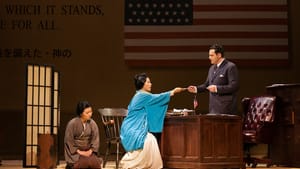Stay in the Loop
BSR publishes on a weekly schedule, with an email newsletter every Wednesday and Thursday morning. There’s no paywall, and subscribing is always free.
A new take on ‘Madame Butterfly’
The 2014 Glimmerglass Opera Festival, part two

Tissue manufacturers love Puccini’s masterpiece Madame Butterfly. Any eyes equipped with tear ducts are guaranteed to moisten, if not gush. The recently concluded 2014 Summer Glimmerglass Butterfly production certainly did its part to upend emotions and tug hankies from pockets.
Yunah Lee was sympathetic as the doomed heroine, Cio-Cio-San (Butterfly). Her honey-toned soprano had crisp edges nicely complementing her intimately scaled yet perky stage presence. Kristen Choi was effective as her servant, Suzuki. Dinyar Vania was bland as Lieutenant B. F. Pinkerton, Butterfly’s two-timing American husband. Highest accolades go to baritone Aleksey Bogdanov as the American consul, Sharpless. His performance was so engaging that, without upstaging his colleagues, he almost shifted the opera’s focus to his character’s own emotional turmoil. The orchestra was outstanding, with spot-on attention to Puccini’s elusive ebb and flow. Conductor Joseph Colaneri’s assumption of the role of music director bodes well for the company.
Nearly always, the fortunes of a Butterfly production reside with its leading soprano. Despite some fine singing, the final ledger balanced differently here. This Butterfly belonged mostly to artistic director Francesca Zambello, who provided many distinctive touches. One novelty concerned the use of sets. A typical staging situates Cio-Cio-San in the confinement of her home for the nearly three hours duration of the opera. We, the audience, readily sympathize with her plight because we are, so to speak, trapped along with her.
Alone in a crowd
In this case, however, Zambello departed from tradition and situated much of the production away from Butterfly’s home, displacing it to Sharpless’s nondescript consular offices in Nagasaki. Along with numerous nameless people, Butterfly was compelled to wait her turn in a frustrating bureaucratic maze. Indoors or out, surrounded or alone, Butterfly was hostage to other people’s agendas. It is a credit to this production that the audience felt hemmed in with its protagonist no matter the setting.
Other touches suggested a surprising psychological undercurrent: Butterfly’s growing independence. Through body posture and carefully orchestrated stage movements, Yunah Lee’s Butterfly appeared self-determined all the while she was being victimized. In one scene, she rejected her rich would-be suitor, Prince Yamadori — at first playfully, then emphatically.
An earlier scene depicted the brazen Pinkerton as startlingly inept. Despite being opera’s greatest cad, Pinkerton does indeed have a small moment for partial redemption. That flash comes when Butterfly’s uncle, a Buddhist monk, publicly upbraids her for abandoning the family faith. An alert Pinkerton would display husbandly gallantry. Surely, that is what we have waited for: the moment when Pinkerton stops pinning his bride’s wings — hence the title, Butterfly — and defends her. But here, no: The offending uncle scurried away before Pinkerton could raise a fuss. Pinkerton was a mere bystander, the result being that his ineffectuality refocused attention yet again on the isolation of his unfortunate spouse. Here, as elsewhere, Zambello presented a unique take on an opera that can often appear workaday.
A 21st-century director
 Indeed, Zambello may well be a model for opera directors in the 21st century. Amid the gentle hullabaloo of the opera grounds, Zambello was consistently an enlivening fixture, constantly cultivating her audiences and performers, enthusiastically greeting all visitors, and personally introducing every presentation. She lives in the community and tirelessly exhorts her audiences to engage with opera. And in addition to all of this, she directs richly-textured productions. When does this woman sleep?
Indeed, Zambello may well be a model for opera directors in the 21st century. Amid the gentle hullabaloo of the opera grounds, Zambello was consistently an enlivening fixture, constantly cultivating her audiences and performers, enthusiastically greeting all visitors, and personally introducing every presentation. She lives in the community and tirelessly exhorts her audiences to engage with opera. And in addition to all of this, she directs richly-textured productions. When does this woman sleep?
Also significant, she has brought financial viability back to Glimmerglass following some years of rough sledding. At $7 million, the Glimmerglass budget is a trifling fraction of the Metropolitan Opera’s $311 million dollar budget, but not too far from Opera Philadelphia’s budget of $10.8 million. These are difficult economic times, and although a little trouble is good for the opera soul, a lot of trouble scares off board members. (Hats off to all opera directors these days for their courage and persistence!)
Glimmerglass’s four festival productions attracted about 33,000 visitors during the company’s busy six-week season. Because its aims were so admirable and the participants were trying so hard, it seems churlish to complain about the variability of singing (too many students on the main stage), the skimpy sets, and the rough edges of the orchestra. But these concerns are substantial and need to be addressed.
A 21st-century festival
Glimmerglass’s repertoire is unusually diverse. It often features two operatic curiosities per season. Recent seasons have included such rarities as Wagner’s Das Liebesverbot, Verdi’s Un Giorno di Regno, Lully’s Armide, and Weill’s Lost in the Stars. There have been significant new works by contemporary composers Philip Glass, David Lang, Jeanine Tesori, and John Musto. The company is at its best when pursuing roads not taken.
Apart from the operas, Glimmerglass offers other enticements. A particularly generous example: free pre-concert talks at every performance. And the season was crammed full of imaginative events, such as Justice Ruth Bader Ginsburg’s discussion of law and justice in opera. Master classes were offered by established stars, including Jessye Norman, Christine Goerke, Deborah Voigt, Jonathan Miller, and Philadelphia’s Eric Owens (now lead artistic advisor). The company’s attractions were enhanced by the pastoral atmosphere surrounding it in the Otsega Lake region. Shakespeare’s words might never be applied more aptly:
How sweet the moonlight sleeps upon this bank!
Here will we sit and let the sounds of music
Creep in our ears: soft stillness and the night
Become the touches of sweet harmony.
Surely some deus ex machina should enable Glimmerglass to attain higher peaks. Until then, thank goodness we have Francesca Zambello.
For part one of Karl Middleman’s review of the Glimmerglass Festival, click here.
Photo of Zambello by Claire McAdams/Glimmerglass Festival.
What, When, Where
Glimmerglass Festival 2014. July 11 to August 24, 2014. Cooperstown, NY. http://glimmerglass.org/
Sign up for our newsletter
All of the week's new articles, all in one place. Sign up for the free weekly BSR newsletters, and don't miss a conversation.

 Karl Middleman
Karl Middleman